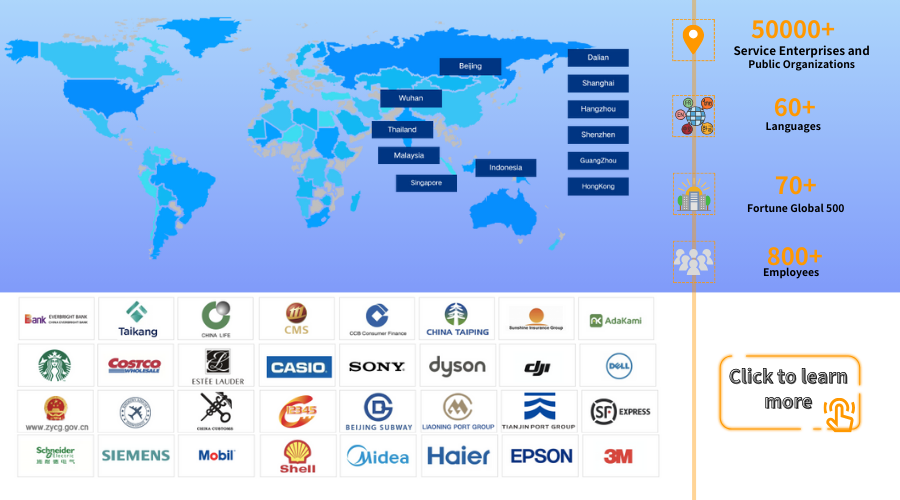Intelligent Ticketing System: The Core Driver for Efficient Enterprise Operations
文章摘要:Amid the global digital wave, enterprise operations face unprecedented complexity and fast-paced challenges. The diversification of customer needs, the refinement of business processes, and the intensification of internal collaboration all impose strict requirements on enterprises’ response speed and handling efficiency. As a product integrating advanced technology and innovative management concepts, the intelligent ticket system is gradually moving from the background to the foreground. It has become a key tool for enterprises to achieve efficient operations and enhance competitiveness, profoundly reshaping the service and management ecology of enterprises.
Table of contents for this article
- I. The Rise of Intelligent Ticket Systems: Driven by the Times and Needs
- II. Analysis of Core Functions of Intelligent Ticket Systems
- 1. Intelligent Creation and Accurate Distribution
- 2. Automated Workflow Engine
- 3. Automated SLA Management and Early Warning
- 4. Knowledge Base Empowerment and Self-Service
- 5. Data-Driven Decision-Making
- III. Panoramic Industry Applications of Intelligent Ticket Systems
- 1. Manufacturing Industry
- 2. Service Industry
- 3. IT Industry
- 4. Logistics Industry
- IV. Future Outlook of Intelligent Ticket Systems
I. The Rise of Intelligent Ticket Systems: Driven by the Times and Needs
II. Analysis of Core Functions of Intelligent Ticket Systems
1. Intelligent Creation and Accurate Distribution
When customers initiate requests through any channel—such as webpages, APPs, emails, phones, or social media—the system uses Natural Language Processing (NLP) technology to instantly analyze the content of the problem. It automatically identifies the problem type (e.g., technical consultation, after-sales complaint, product suggestion), urgency level, and customer value grade. Subsequently, based on preset intelligent assignment rules—such as skill group matching (accurately assigning technical problems to senior technical experts), load balancing (avoiding ticket accumulation for a single employee), and Service Level Agreement (SLA) requirements (prioritizing urgent tickets from high-priority customers)—the system distributes the ticket to the most suitable handler or team in a flash.
2. Automated Workflow Engine
The intelligent ticket system abandons the traditional simple ticket transmission model and has a built-in powerful automated workflow engine. Enterprises can flexibly preset complex ticket circulation paths according to their own business processes.
3. Automated SLA Management and Early Warning
The Service Level Agreement (SLA) is an enterprise’s service commitment to customers, and the intelligent ticket system serves as a firm guardian of this commitment. The system strictly monitors the handling timeliness of each ticket, including key nodes such as first response time and final resolution deadline.
4. Knowledge Base Empowerment and Self-Service
The intelligent ticket system is deeply integrated with the enterprise knowledge base, providing strong support for both customer service staff and customers. When handling tickets, the system intelligently recommends relevant solution articles, historical successful cases, or operation guides based on problem keywords, helping customer service respond quickly and shorten the problem-solving time.
5. Data-Driven Decision-Making
The intelligent ticket system is like a data treasure trove, automatically accumulating a large amount of operational data, covering multi-dimensional information such as ticket volume trends, handling time distribution, backlog status, team and individual performance, problem classification statistics, and Customer Satisfaction (CSAT).
III. Panoramic Industry Applications of Intelligent Ticket Systems
1. Manufacturing Industry
In the manufacturing industry, the intelligent ticket system runs through key links such as equipment maintenance, production scheduling, and quality inspection. Once equipment sensors detect abnormalities, they automatically create maintenance tickets and accurately assign them to maintenance personnel, while attaching reference to historical equipment fault records and maintenance plans, significantly shortening equipment downtime. In production scheduling, based on order requirements and production capacity, intelligent tickets are generated and reasonably allocated to various production links, with real-time progress tracking to ensure the smooth implementation of production plans. In the quality inspection link, detected problems are quickly converted into tickets, linked to responsible departments and personnel, and promoted to be rectified in a timely manner to ensure product quality. For example, after a car manufacturing plant applied the intelligent ticket system, the average equipment maintenance time was shortened by 50%, and production efficiency was increased by 30%.
2. Service Industry
Take property management as an example: maintenance requests, complaints, and suggestions feedback by owners through APPs, phones, official WeChat accounts, and other channels are uniformly collected in the intelligent ticket system. The system automatically classifies and assigns tickets; maintenance personnel receive tickets through mobile terminals, view detailed problem descriptions and location information, and handle them on-site in a timely manner. The handling process and results are updated in real time, and owners can check the progress at any time. With the help of the system’s customer satisfaction survey function, property management can also collect owner feedback in a timely manner and continuously optimize services. This model is also applicable to hotels, catering, and other service industries, significantly improving customer service experience and corporate reputation.
3. IT Industry
In project management, the intelligent ticket system helps project managers break down project tasks into tickets, assign them to team members, track task progress and delivery results, and promptly identify and solve project risks. In the field of technical support, software vulnerabilities and usage problems reported by customers are quickly converted into tickets, which are intelligently assigned to corresponding technical personnel based on the severity and technical difficulty of the problems. The system provides solution recommendations and knowledge base support to accelerate problem-solving. After a software company used the intelligent ticket system, the average problem-solving time for customers was shortened from 2 days to 6 hours, and the customer retention rate increased by 20%.
4. Logistics Industry
Logistics enterprises rely on intelligent ticket systems to achieve refined management of the entire transportation, warehousing, and distribution processes. After an order is generated, a transportation ticket is automatically created, and vehicles are intelligently dispatched based on factors such as vehicle location, load capacity, and route planning. When the warehouse receives goods, an inbound ticket is automatically generated to record goods information and storage location. In the distribution link, distribution tickets are intelligently assigned based on order addresses and delivery staff locations, with real-time tracking of distribution progress. In case of abnormalities (such as traffic jams, customer refusal to accept goods), early warnings and solutions are automatically triggered. After a large logistics enterprise introduced the intelligent ticket system, the on-time delivery rate increased to 95%, and logistics costs decreased by 15%.
IV. Future Outlook of Intelligent Ticket Systems
Looking ahead, the intelligent ticket system will continue to evolve and deeply integrate with emerging technologies. On the one hand, artificial intelligence will be further empowered: the application of large language models will enable the system to have stronger semantic understanding and problem-solving capabilities, allowing it to handle more complex and ambiguous business requests and achieve more natural and smooth human-computer interaction. On the other hand, integration with the Internet of Things (IoT) will expand the application boundaries: equipment and products will upload operation data in real time, automatically generate tickets, and realize preventive maintenance and intelligent operations.
3. IT Industry
In project management, the intelligent ticket system helps project managers break down project tasks into tickets, assign them to team members, track task progress and delivery results, and promptly identify and solve project risks. In the field of technical support, software vulnerabilities and usage problems reported by customers are quickly converted into tickets, which are intelligently assigned to corresponding technical personnel based on the severity and technical difficulty of the problems. The system provides solution recommendations and knowledge base support to accelerate problem-solving. After a software company used the intelligent ticket system, the average problem-solving time for customers was shortened from 2 days to 6 hours, and the customer retention rate increased by 20%.
4. Logistics Industry
Logistics enterprises rely on intelligent ticket systems to achieve refined management of the entire transportation, warehousing, and distribution processes. After an order is generated, a transportation ticket is automatically created, and vehicles are intelligently dispatched based on factors such as vehicle location, load capacity, and route planning. When the warehouse receives goods, an inbound ticket is automatically generated to record goods information and storage location. In the distribution link, distribution tickets are intelligently assigned based on order addresses and delivery staff locations, with real-time tracking of distribution progress. In case of abnormalities (such as traffic jams, customer refusal to accept goods), early warnings and solutions are automatically triggered. After a large logistics enterprise introduced the intelligent ticket system, the on-time delivery rate increased to 95%, and logistics costs decreased by 15%.
IV. Future Outlook of Intelligent Ticket Systems
Looking ahead, the intelligent ticket system will continue to evolve and deeply integrate with emerging technologies. On the one hand, artificial intelligence will be further empowered: the application of large language models will enable the system to have stronger semantic understanding and problem-solving capabilities, allowing it to handle more complex and ambiguous business requests and achieve more natural and smooth human-computer interaction. On the other hand, integration with the Internet of Things (IoT) will expand the application boundaries: equipment and products will upload operation data in real time, automatically generate tickets, and realize preventive maintenance and intelligent operations.
IV. Future Outlook of Intelligent Ticket Systems
The article is original by Udesk, and when reprinted, the source must be indicated:https://my.udeskglobal.com/blog/intelligent-ticketing-system-the-core-driver-for-efficient-enterprise-operations.html
Intelligent TicketingIntelligent Ticketing SystemTicketing System

 Customer Service& Support Blog
Customer Service& Support Blog


